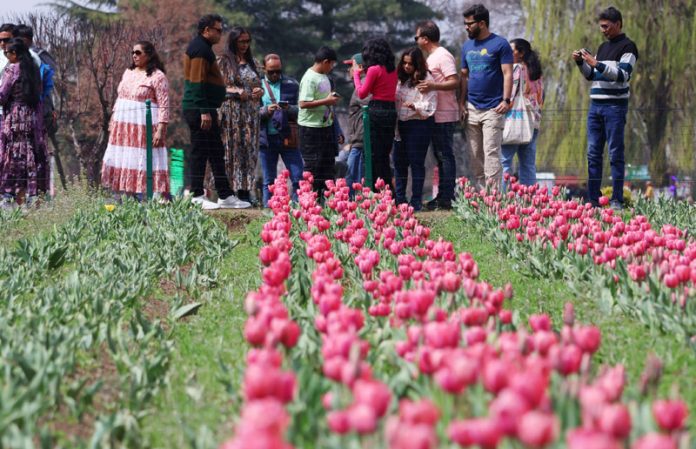Located amidst the awe-inspiring scenery of Srinagar, the Tulip Garden stands as a tribute to the magnificence of nature and human ingenuity. As the largest tulip garden in Asia, it attracts visitors from distant places to admire its lively blossoms and peaceful environment. It signifies not only the start of a fresh season but also a commemoration of vitality, vibrancy, and rejuvenation. The allure of the Tulip Garden lies not only in its vast expanse but also in the meticulous care and attention to detail that goes into its maintenance and upkeep. With nearly 1.7 million tulips set to bloom this spring, the garden promises a visual spectacle unlike any other. Each year, officials strive to enhance the visitor experience by introducing new varieties of tulips and ensuring that the garden remains a haven of tranquillity and beauty.
However, as visitors flock to the garden on its reopening day, some may express disappointment at the limited bloom. Understandably, anticipation runs high, and expectations are set for a spectacle of colours in full bloom. Yet, it is essential to recognise the delicate balance of nature and the unpredictability of weather patterns that influence the timing of blooms. While some may lament the timing of the reopening, others find joy in the promise of what is to come. It is a transitional phase between bud and blossom, where every passing day brings the promise of new life and vibrant colours.
Situated along the picturesque banks of Dal Lake, the Tulip Garden is not just a destination but a journey of exploration, discovery, and appreciation for the wonders of the natural world. As visitors meander through its verdant pathways and marvel at the kaleidoscope of colours, they are reminded of the interconnectedness of all life and the importance of preserving and nurturing our environment for generations to come. Behind the scenes, a dedicated team of professionals works tirelessly to ensure that the Tulip Garden remains a symbol of excellence and beauty. Their efforts extend far beyond mere maintenance, encompassing a deep-seated commitment to environmental stewardship and sustainable practices. The addition of new tulip varieties hints at an ever-evolving spectacle, ensuring a fresh experience for returning visitors. This dedication to improvement reflects a commitment to maintaining the garden’s status as a premier tourist destination.
Since its establishment, the Tulip Garden has significantly transformed the landscape of Kashmir. Traditionally, tourist influx is less during this time, but the Tulip Garden, with its vibrant display, now attracts visitors during this season, lengthening the tourism window and boosting the local economy. Statistics speak for themselves; with last year witnessing a record 3.77 lakh visitors in just 30 days, the Tulip Garden is a major draw. The garden showcases a different side of Kashmir, one focused on natural beauty and hospitality. This positive image helps counter negative perceptions and encourages tourism. The influx of tourists translates to increased business for hotels, restaurants, transportation services, and local craftspeople. The garden itself creates temporary jobs during peak season. The focus on eco-friendly practices aligns with current tourism trends, ensuring the garden’s long-term appeal. The Tulip Festival, held alongside the blooming season, offers visitors a chance to experience Kashmiri folk music and cuisine, fostering cultural understanding and appreciation.
The opening of the Srinagar Tulip Garden for the new season heralds the arrival of spring in Kashmir and anticipates a bustling summer tourist season. In essence, the Tulip Garden has become a major tourist attraction, extending the season, attracting larger crowds, promoting a positive image of Kashmir, and generating economic benefits for the region. It’s a vibrant symbol of Kashmir’s natural beauty and cultural richness.
Trending Now
E-Paper


